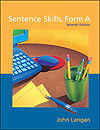 |  Sentence Skills, Form A, 7/e John Langan,
Atlantic Cape Community College
Additional Information about Verbs
Key Terms
| gerund | a verbal; the -ing form of the verb used as a noun. Ex.: I love dancing.
|  |  |  | | helping verbs | 1. three common verbs that can either stand alone or be combined with ("help") other verbs: be, have, and do. Ex.: "I was angry" ("was" stands alone); "I was helping Sue" ("was" acts as helping verb).
2. nine verbs (also known as modals or modal auxiliaries) that are always used in combination with other verbs: can, could, may, might, shall, should, will, would, must
|  |  |  | | infinitive | a verbal; to plus the base form of the verb. Ex.: I love to dance.
|  |  |  | | modal auxiliaries | see modals
|  |  |  | | modals | nine verbs (also known as helping verbs) that are always used in combination with other verbs: can, could, may, might, shall, should, will, would, must
|  |  |  | | participle | a verbal; the -ing or -ed form of the verb used as an adjective. Ex.: I love dancing bears.
|  |  |  | | verb tense | the time that a verb shows
| Tense | Example | | Present | I work. | | Past | I worked. | | Future | I will work. | | Present perfect | I have worked. | | Past perfect | I had worked. | | Future perfect | I will have worked. | | Present progressive | I am working. | | Past progressive | I was working. | | Future progressive | I will be working. | | Present perfect progressive | I have been working. | | Past perfect progressive | I had been working. | | Future perfect progressive | I will have been working. |
|  |  |  | | verbals | words formed from verbs that often express action: these include infinitives, gerunds, and participles
|
|



 2003 McGraw-Hill Higher Education
2003 McGraw-Hill Higher Education